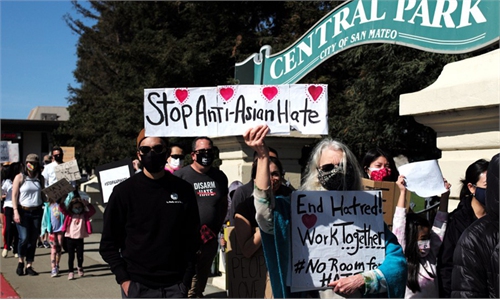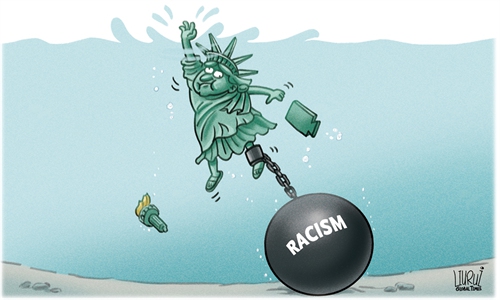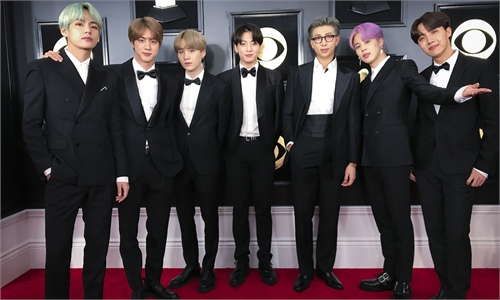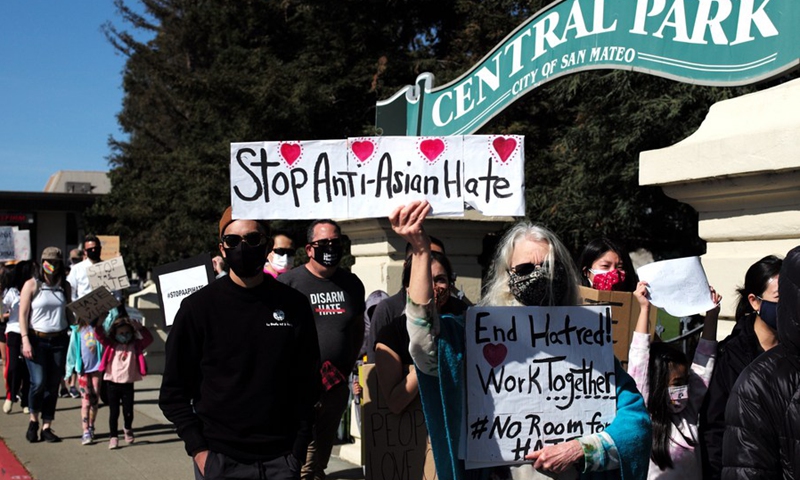
People take part in a rally against anti-Asian hate crimes in San Mateo, California, the United States, on Feb. 27, 2021. (Photo: Xinhua)
Former US President Donald Trump and his "toxic" political influence may easily be identified as the culprits for the rising anti-Asian wave in the US, with the most recent one involving shootings that killed eight people, among which six were Asians, in Atlanta-area massage parlors. But there are more accomplices.
US media that have ramped up their propaganda machine to disparage China in recent years, and pinpoint China as the origin of the COVID-19 pandemic that has ravaged the world should also shoulder fair share of responsibility for instigating hatred towards Asian group, said observers. They also believe that as US society faces increasing domestic woes, racial discrimination could be an easy way for people to vent off their dissatisfaction.
21-year-old Robert Aaron Long, a white gunman, was charged Wednesday with killing eight people at three Atlanta-area massage parlors. Among them, six were women of Asian descent.
Although Long told police that Tuesday's attack was not racially motivated, investigators said they had not ruled out bias as a motivating factor.
The latest killing has sent a chill among Asian Americans, who have suffered a spike of attacks in recent years, especially after the COVID-19 outbreak.
Philip Choi, advisor of the Chinese American Association of Commerce living in San Francisco, said that the attacks have gripped his heart and he is very concerned about it. "Now the vulnerable groups, such as elderly and females, are more easily subject to discriminative cases against Asians. Several elderly Asians even died from racist attacks in the Bay Area during the past few months," Choi told the Global Times.
On Wednesday, 76-year-old Chinese American woman Xie Xiaozhen was attacked in San Francisco by a white man in his 30s.
The woman's son-in-law John Chen told the Global Times that Xie was attacked while out for a walk. "She was waiting for the traffic light to turn green when she suddenly heard someone aggressively yelling 'Chinese! Chinese,' and before she could react, she had already been punched in the face," Chen said.
As CBS reported, San Francisco police did not disclose a motive behind the attack and it was not clear whether the victim's race had anything to do with the assault. They are working to determine if racial discrimination was a factor.
According to Stop AAPI Hate, from 19 March 2020 to 28 February 2021, the group received 3,795 reports against Asian-Americans. It said that Chinese Americans received most of the attacks, accounting for 42.2 percent.
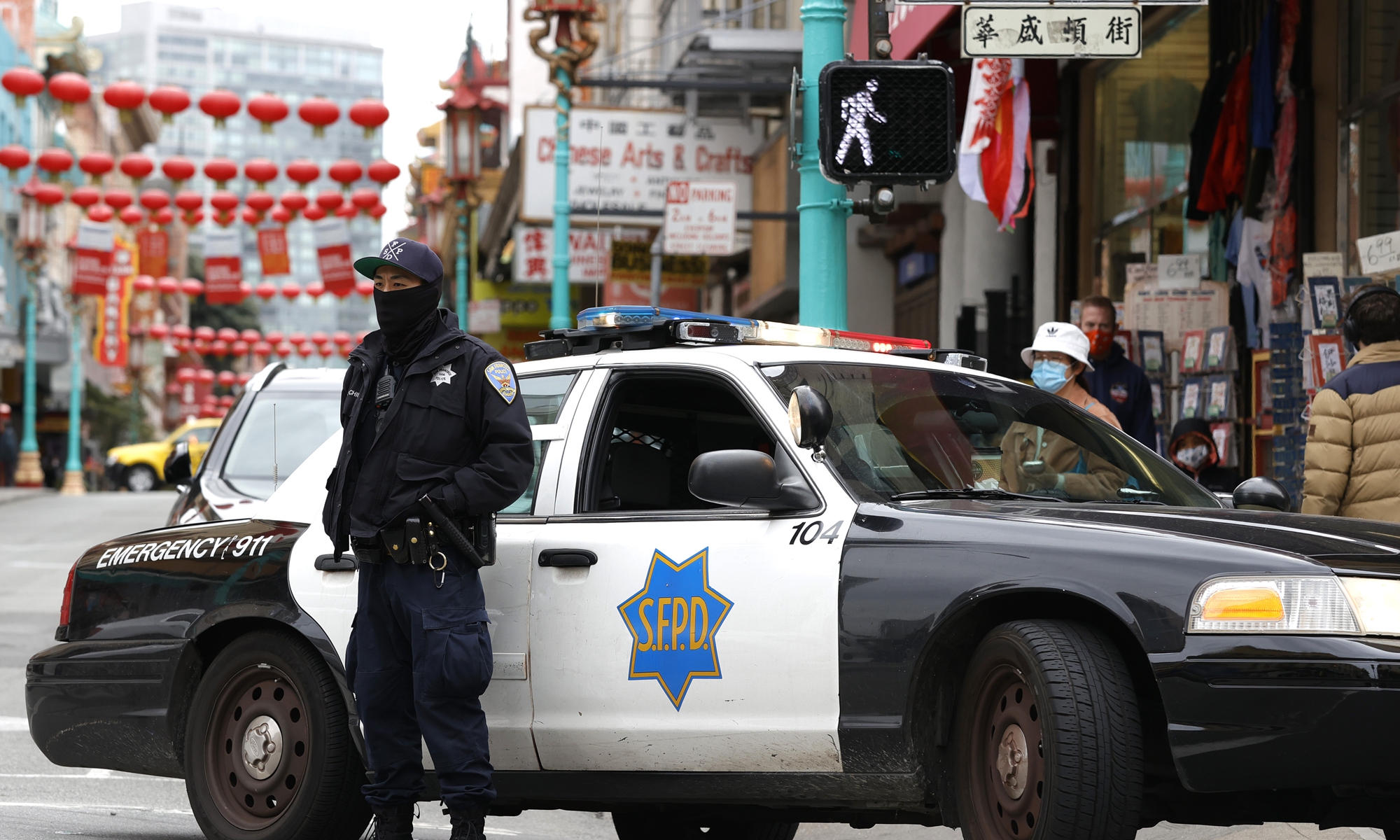
A San Francisco police officer stands guard on Grant Avenue in Chinatown on Wednesday. The San Francisco police have stepped up patrols in Asian neighborhoods in the wake of a series of shootings at spas in the Atlanta area that left eight people dead, including six Asian women. The main suspect, Robert Aaron Long, 21, has been taken into custody. The San Francisco Bay Area is also seeing an increase in violence against the Asian community. Photo: VCG
Fire starters
US society's rising racism against Asians was fueled mainly by former US President Donald Trump's disparaging of China over COVID-19 pandemic, said Choi, noting that many are also venting their dissatisfaction on Chinese, after the US economy was battered by the pandemic.
Trump had frequently railed against the "China virus" and "kung flu." Yet his administration also instigated conflict among the world's two largest economies — on trade, security and technology — and has propelled a growing number of Americans to regard ?China as the "greatest enemy" of the US, according to a Gallup poll this week.
After the attack, White House press secretary Jen Psaki, and Zhao Lijian, spokesperson of Chinese Ministry of Foreign Affairs, pointed out that the former US administration and certain politicians' words and deeds contributed to US domestic hostility against Asian Americans.
The Trump administration's reckless behavior only ripped a hole in long- simmering racism and white supremacy, which was silenced by society's mainstream "political correctness," said Shen Yi, a professor at the School of International Relations and Public Affairs of Fudan University.
Shen said racial conflicts have also been rampant in the US because some Americans see racial discrimination as an outlet for frustrations on their troubled society, including the government's mishandling of COVID-19, high unemployment rate and the sluggish economy.
A Chinese American who lives in New York City told the Global Times that he has also been subjected to racist invectives from people here, thanks largely to Trump's effort to deflect responsibility and blame China for his COVID-19 handling failure. "But racism is everywhere and people are always looking for others to blame for their troubles, or someone for them to feel superior to. This is a fundamental flaw in US society."
Another less noticeable reason that has been behind such hatred, according to Chinese observers, is Western media.
In recent years, whether conservative media, such as Fox News, or so-called liberal media, like the New York Times, have published "biased and groundless" reports about China, Xin Qiang, deputy director of the Center for American Studies at Fudan University, told the Global Times, noting that their attempt to sell newspapers and garner clicks, in return invited attacks and even bloodshed to the Asian group in the US as a whole.
One example would be Melissa Chan, an American journalist who works for Deutsche Welle, who came under the spotlight after she forwarded a Foreign Policy article "Anti-Asian Attacks Are Blighting the United States" on Twitter on Tuesday. She commented that "In addition to condemning anti-Asian attacks, these experts note that racism serves as propaganda gold for China which attempts 'to portray itself as the head of the global Chinese diaspora.'"
Her tweets have generated criticism. One of the replies to her tweet tagged Deutsche Welle, urging it to think twice while hiring "propagandists" like Chan. "How much more blood do you need to see to stop extremists from spreading more hate?"
The New York Times was also drawn into the debate as to who should be blamed for inciting hatred after it published an article about China approving a hamster ovary (CHO) vaccine for emergency use.
It posted on Twitter that "China has approved its fifth COVID-19 vaccine, and it's made from the ovary cells of hamsters." The way it describes outraged Chinese netizens, who believe the media outlet is misleading its readers to think the vaccine is made out of hamster ovaries, and to cater to some Americans' racist stereotypes that believe the coronavirus is "Chinese bat virus."
Sandra Steingraber, an American biologist and author, replied in a tweet comment, saying "This is such an irresponsible soft-racist headline. Hamster ovary cell lines are how labs all over the world make proteins…Please STOP implying that the Chinese do weird things with animals."
Another Chinese American who declined to reveal his identity said that in recent years, especially after the outbreak of COVID-19, US media have been downgraded to "propaganda machines" who rile against China on the virus origin and other issues.
"Their reports did not change the fact that US government failed to cope with the outbreak, or whitewash their political system and incompetent politicians. Rather, they have spread the seeds of racial hatred that may take generations to remove," he said.
A dimming beacon
The US has always claimed itself as a "beacon of human rights," yet its recent record of human rights violations such as the killing of George Floyd, and its mishandling of COVID-19, have placed Washington under the world's scrutiny, according to Shen.
Speaking at a press conference Thursday, Zhao Lijian said that racial discrimination and violence in law enforcement have been severe in the US. The self-claimed "beacon of human rights" should really shed light on itself sometimes, according to Zhao.
Statistics show that, from January to November 2020, there were only 17 days without law enforcement personnel causing deaths in the US.
A number of countries including Venezuela, Syria, and Belarus also criticized the human rights violations in the US at the 46th session of the UN Human Rights Council on Wednesday.
They called on the US to first take a look at itself before jumping to conclusions about others on the issue.
Zhu Ying, deputy director of the National Human Rights Education and Training Base of Southwest University of Political Science and Law, told the Global Times that the recent cases expose the true human rights situation in the US — a turning point in the US' democratic system.
"Triggered by the pandemic, 2020 was a turning point for the US' democratic system from victory to decline, and Joe Biden will not reverse the declining trend of its democratic system."
